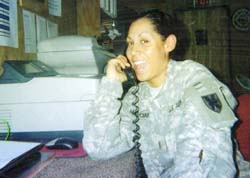| Maryland Newsline |
| Home Page |
Politics
|
| Latina Army Officer Balances Duty and Culture By Arelis Hernandez Capital News Service Thursday, Nov. 8, 2007
Taking a few hours for herself after her 12-hour shifts is what Army First Lt. Bianca Marchany said keeps her sane. After spending all night coordinating convoys that carry supplies to soldiers in Iraq, the 23-year-old Marchany said spending time alone inside her wooden hut allows her to decompress before bed time at 4 p.m. “It’s just like the movie 'Groundhog Day,' ” Marchany said about her schedule, which begins at midnight with a snack and ends around noon. Although she doesn’t move much from her base in Scania, south of Baghdad, Marchany, of Puerto Rican and Mexican heritage, said she knows her mission is important. “It is not the ‘front line in the fight’ kind of job,” she said. “We cannot single-handedly help Americans succeed in this war … but we can definitely single-handedly help them fail.” Marchany is one of more than 130,000 Hispanic troops on active duty, representing about 10 percent of the U.S. armed forces, according to the Department of Defense. She is also part of a small percentage—5 percent—of commissioned officers who are both female and Hispanic, according to Army statistics from 2004. “Being in the Army is tough. Being a woman in the Army is tough,” Marchany said, adding the sexual orientation of female soldiers is often questioned. Stereotypes have to be overcome, she said, “especially when you have an installation with 500 men and 20 women, all stuck in the middle of nowhere Iraq for 15 months.” Marchany said she was drawn to military life as a child, since her father served in the Army for 21 years. She said she never thought of doing anything else. “Most children want to be a doctor or a teacher or a lawyer or something,” Marchany said in an e-mail. “I never related to any of that, nor did I understand the need. But I was always drawn to uniformity of the military.”
Growing up in different communties in Maryland, she remembers that when flags were unfurled and fireworks enagaged during Fourth of July festivities, she’d be watching soldiers exhibit their patriotism. “I just always wanted to serve,” Marchany said. “It sounds corny, but I love this country, and I didn't want anything to happen to it.” Marchany entered the military right after graduating from Maryland in 2006, where she was an student in the university’s Reserve Officers’ Training Corps program. The communications major went through the ROTC’s advanced courses, which commits students to service with the Army upon graduation. She said she has been in Iraq since July 2007, and is due to redeploy in October 2008. “I think a lot about my future, and if I can live with another deployment after this one,” Marchany said. “Most of my soldiers have been deployed to Iraq or Afghanistan at least twice. Some of them are here for the fourth time, and I can't imagine having to leave my family like that over and over again.” Sometimes the University of Maryland alumnus can’t keep track of the days and drifts backwards in time. “Sometimes the days fly by so fast I can't even remember what happened,” Marchany said in an e-mail. “Other days run so slow that I can't help but wish I was back in College Park sitting on the patio at Santa Fe [Cafe} for Wings and Yings with my girls.” “In the military you have two groups, the Officers and the Enlisted,” she said. “It’s the same as white collar and blue collar” distinctions in the professional world. Her status brings with it special challenges. “The Officer Corps in the Army is mostly composed of white men and women, mostly men,” Marchany said. “If you are a woman and or especially of color, you are the minority, and you're ‘gently forced’ into a ‘gentleman's club’ type of organization. It's like they say, ‘You're an Officer and a Gentleman.’ ” She said unspoken norms of conduct expected from officers can occassionally conflict with her cultural values. “My soldiers and fellow officers would be astonished if they saw me at the club dancing salsa or dancing to reggeaton,” Marchany e-mailed about her love for Latin music. “As an Officer, you're always expected to act a certain way, and to be frank, that isn't exactly how most Latinos are raised to act.” Cultural rifts may also creep up between U.S.-born Latinos like herself, who are more proficient in English, and first-generation Latinos, who speak more Spanish. When three National Guard units from Puerto Rico arrived at Marchany’s base, she said she did not find much in common with them initially, but she could not deny their shared physical traits. Marchany, who speaks limited Spanish, said exposure to Latino culture through soldier-initiated salsa nights and dinners featuring traditional meals helped her reconnect to her heritage. Educating others, including her soldiers, about Hispanic heritage has become a personal mission. “I think I'm going to start putting out a ‘Hispanic Heritage Soldier Fact of the Day’ or something to pass on knowledge to my soldiers,” she said.
The growing visibility of Latinos in the armed forces and in the United States at large has struck a cord with Marchany, who said it is her personal responsibility to “squash stereotypes.” “Officers are leaders, and leaders are reponsible for bettering their soldiers,” said Marchany, adding she has encountered many offensive typecasts throughout her military career. “Sharing my culture would be just that … if you have the opportunity to do something, why not?” Marchany said she has had to grapple with the “sexy latina” portrayal perpetuated in the media and the expectations generated by the label. As a U.S.-born Latina, she engenders a different sense of “latinity” often unexplored by broad generalizations. “A simple explanation can go a long way,” Marchany said. “It doesn’t take attitude or aggression. Just communication.” Copyright © 2007 University of Maryland Philip Merrill College of Journalism
|



